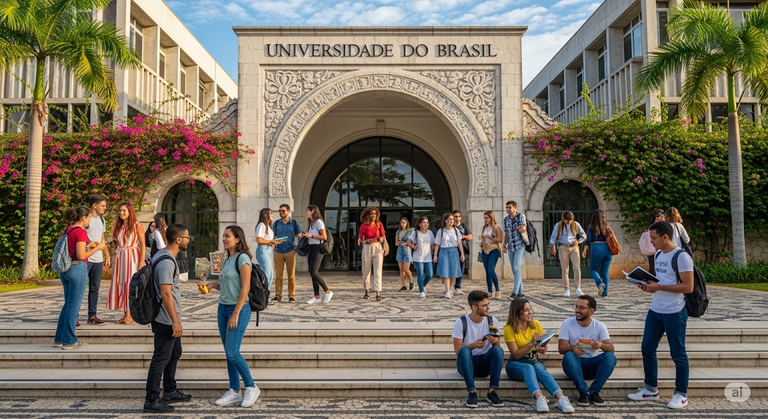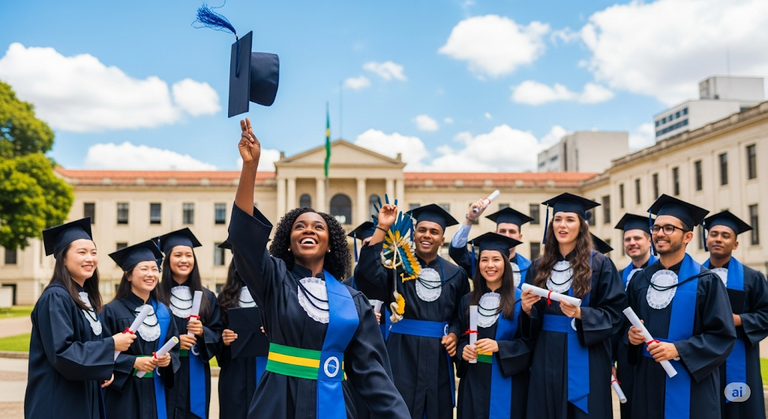EN-PT The quota policy and access to education in Brazil
 Representation of access to university in Brazil, made by Gemini 2.5 PRO
Representation of access to university in Brazil, made by Gemini 2.5 PRO
We often talk about education and the different ways countries organize their education systems. Here in Brazil, we have a situation that seems quite favorable at first glance, as basic education is mandatory for all children up to the age of 18. Does this mean that our people are widely literate? I don’t believe the answer is that simple. But let’s try to clarify it a bit.
With the obligation to keep children in school, we have a strong incentive for all parents who do not want to be arrested for neglect. From the poorest to the richest, everyone knows that if a child stops attending school for a few days, soon a police officer and a social worker will be knocking on their door. So yes, we all have the habit and culture of sending our children to school for all two hundred school days of each calendar year.
In theory, all young people are able to complete the mandatory basic education before the age of 18. What comes next can be decided by them, meaning it is optional. The Brazilian education system is divided into two levels:
- Basic education – from elementary school to high school;
- Higher education – undergraduate and postgraduate studies.
Higher education is optional, being offered free of charge by the Brazilian government as well as by private institutions. Choosing a higher education course and enrolling in it may be the easiest part; they say graduating from the chosen course is the hard part.
There are no restrictions regarding gender or age for entering higher education, with the most common method being ranking candidates by the score obtained in a nationwide exam (ENEM). Candidates with the highest scores choose the best courses, and as everyone knows, the medicine course is the most sought after, as it is often a highly profitable profession! Of course, only the most prepared manage to secure a spot, and for that, you can be sure it is necessary to study far beyond what is taught in school.
There are many preparatory courses to raise the level of candidates who wish to enter medicine. This is necessary because every point can be decisive in breaking ties for admission. These courses are private, so you can imagine how this profession is the classic representation of elitism, being completely unattainable for the poor population.
But that’s where you’re wrong!
Thanks to a national law, public courses are required to reserve spots for minority populations. This is called the quota law, which mandates that half of the spots in each public undergraduate program be reserved for low-income individuals, Black people, people with disabilities, and Indigenous peoples.
 Representation of Brazil’s quota policy, made by Gemini 2.5 PRO
Representation of Brazil’s quota policy, made by Gemini 2.5 PRO
This means that even if the white bourgeois elite have the best scores to enter medical school, poor Black disabled Indigenous people will be pulled up from the bottom of the list to have the opportunity to take the course.
Does this ensure that these historically oppressed populations will be able to complete the course? No, and for that, other public policies are necessary to ensure retention and successful completion. Stories of young people from the outskirts who overcame the system are told in mainstream media as stories of resilience and inspire others in similar situations to face the system.
I am a strong supporter of universal and accessible education for all!
And you, what do you think?


 Representação do acesso à universidade no Brasil, feita pelo Gemini 2.5 PRO
Representação do acesso à universidade no Brasil, feita pelo Gemini 2.5 PRO
Muitas vezes conversamos sobre educação e as diferentes formas que os países organizam sua estrutura de ensino. Aqui no Brasil temos uma situação bastante favorável, em uma primeira leitura, pois a educação básica é obrigatória pra todas as crianças até os 18 anos. Isso significa que nosso povo é amplamente alfabetizado? Não acredito que seja uma resposta fácil. Mas vamos tentar esclarecer um pouco.
Com a obrigação de manter as crianças na escola, temos um belo incentivo para todos os pais que não pretendem ser presos por abandono de incapaz. Do mais pobre ao mais rico, todos sabem que se uma criança deixar de comparecer na escola por alguns dias, logo uma visita de uma autoridade policial junto de um assistente social deve bater na sua porta. Então sim, todos temos o costume e a cultura de despachar os filhos para escola todos os duzentos dias letivos de cada ano civil.
Em teoria todos os jovens conseguem cumprir a educação básica obrigatória antes dos 18 anos. O que vem depois pode ser decidido por eles, ou seja, é optativo. O sistema de ensino brasileiro se divide em duas faixas:
- Educação básica - desde o ensino fundamental até o ensino médio;
- Educação superior - graduação e pós graduação.
O ensino superior é facultativo, sendo oferecido gratuitamente pelo estado brasileiro e também por entidades particulares. Escolher um curso superior e ingressar nele pode ser a parte mais fácil, dizem que se formar no curso escolhido é a parte difícil.
Não existe qualquer limitação quanto ao gênero ou idade para o ingresso no ensino superior, sendo que o mais comum é o rankeamento dos interessados por meio de nota obtida em uma prova aplicada em todo território nacional (ENEM). Os candidatos com as melhores notas escolhem os melhores cursos, e como todos sabem o curso de medicina é o mais procurado pois costuma ser uma profissão altamente rentável! É claro que apenas os mais preparados conseguem uma vaga, e para isso tenha certeza que é necessário estudar muito além do que é visto na escola.
Existem muitos cursos preparatórios para elevar o nível dos candidatos que pretendem ingressar em medicina. Isso é necessário pois cada ponto pode ser decisivo no desempate pelas vagas. Esses cursos são privados, então você pode imaginar como essa profissão é a representação clássica do elitismo, sendo completamente inalcançável para a população pobre.
Mas é ai que você se engana!
Graças a uma lei nacional, os cursos públicos são obrigados a reservar vagas para as minorias populacionais. É a chamada lei de cotas, que determina que metade das vagas de cada graduação pública seja reservada para pessoas de baixa renda, pessoas negras, pessoas com deficiência, e indígenas.
 Representação da política de cotas do Brasil, feita pelo Gemini 2.5 PRO
Representação da política de cotas do Brasil, feita pelo Gemini 2.5 PRO
Isso significa que ainda que a elite burguesa branca tenha as melhores notas para ingresso na faculdade de medicina, os pobres pretos deficientes indígenas serão puxados do fim da fila para que tenham oportunidade de realizar o curso.
Isso garante que essas populações historicamente oprimidas serão capazes de concluir o curso? Não, e para isso outras políticas públicas são necessárias para permanência e conclusão com sucesso. As histórias dos jovens periféricos que venceram o sistema são contadas na mídia tradicional como histórias de superação e inspiram outros em situação semelhante a enfrentar o sistema.
Eu sou um grande apoiador da educação universal e acessível para todos!
E você o que acha?


Posted Using INLEO







Obrigado por promover a comunidade Hive-BR em suas postagens.
Vamos seguir fortalecendo a Hive
Acho que o Brasil é um exemplo em relação a conseguir colocar os alunos dentro da escola, o problema é só a qualidade, por conta da corrupção e tudo mais, isso que prejudica muito, mas no resto acho que estamos até OK.
!hbits
crazyphantombr, you mined 1.0 🟧 HBIT If you had replied to another Hive user, the HBIT would have been split: 0.9 for you and 0.1 for them as a tip. When you mine HBIT, you're also playing the Wusang: Isle of Blaq game. 🏴☠️ | tools | wallet | discord | community | daily <><
What's more, you found 1.0 🟡 BLAQGOLD coins as a bonus treasure token!

Your random number was 0.40675189438221704, also viewable in the Discord server, #hbit-wusang-log channel. Check for bonus treasure tokens by entering your username at a block explorer A, explorer B, or take a look at your wallet.
There is a treasure chest of bitcoin sats hidden in Wusang: Isle of Blaq. Happy treasure hunting! 😃 Read about Hivebits (HBIT) or read the story of Wusang: Isle of Blaq.
I was shocked by what you told us. I didn't really know how this phenomenon occurred in Brazil. I thought the social system in this country would have overcome most of the social problems that unfortunately proliferate around the world.